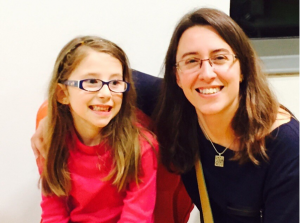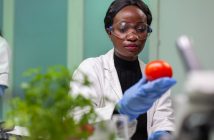Hailing from Spain, Susana Lopez-Querol is a lively scientist currently settled in London. Having majored in civil engineering from Madrid, she discovered her true passion and calling in the soil sciences through her PhD. Slowly but surely, she shifted her entire intellectual focus to Geotechnical Engineering and is now busy scripting a change in this domain through her research and innovation.
She is also transforming the lives of young students in her role as the Senior Lecturer at University College London (UCL).
For our first episode on Women in STEM, we couldn’t have asked for a better subject.
“It is not what I wanted to start with (civil engineering), but slowly, life showed me this direction, and now this is what I am doing, and loving every moment.” quips Susana when asked about her shift in focus. While in Spain, she was working on civil engineering projects, in which she’d specialized during her bachelors and masters courses. During the course of her PhD, Susana started studying the effect of earthquakes on soil, i.e., soil liquefaction. “My aim was to understand the effect of seismic shakes and their effect on soils. We tried to understand this phenomena before an earthquake occurs, so that it can aid in building more sustainable infrastructure and avoid failure or collapse.”
Living the dream, transforming deserts one at a time
Many scientists wait a lifetime before being handed a project so innovative that it requires radical thinking, but Susana is already living her dream.
She is currently working on a project with an innovative company in the Middle East, solving a problem that’s costing them millions of dollars. There are many companies building huge infrastructures across arid areas, but the grueling conditions and the ever eroding hot air in the desert is not helping their cause. And so guess what Susana is working on?
She proposes to use the sand from the desert to build infrastructures and embankments. In short, what has been lying in the desert for eons will now be used to construct properties that can survive the harsh conditions, thereby opening up a new realm of construction and space for all of humankind. We would have thought of such a project to be highly challenging, but not for Susana! This is just a stepping stone for her.
Cleaner planet & sustainable energy – That’s the challenge
“The desert sand transformation project is definitely the dream, but it’s not my most challenging project. My most challenging project is what’s coming up. I am starting to work on a wind turbine projects that will decrease the cost of sustainable and renewable energy through wind turbines.”
Chasing challenges are the norm in this field.
“Wind turbines cost a lot of money, which is why a lot of countries have not adopted it to a full scale as yet. However, it’s the best form of renewable energy available in windy sites and decreases the carbon footprint to a massive scale. My pilot project, which consists of improving the foundations of these infrastructures, in this field is being set up in UK, and once it’s successful, I’m planning to implement this project in other countries as well. The primary aim of this project is to reduce pollution and ensure clean air for all.”
Susana is definitely transforming the world one project at a time!
Practical research application: Worldly words of advice
She has a simple theory to stay updated and continue innovating. “Work with companies and take up projects. Companies benefit through innovative methods that enable cost cutting and process optimization. Approach them for your research. It’s easier to get in touch with companies for application of research. Companies are happy to teach people and to have more intellectuals involved in their projects.”
But when we pointed out that most scientists do not find it this easy to reach out to companies, she had a practical approach. “Conduct research and work on projects that are more practical. Such projects are typically picked up by companies. If you want to work with them, provide innovative solutions to their problems. Simple! That is what engineering is about.”
Multi-tasking maestro
Whoever said women can multi-task like a boss was so right! And for Susana, multi-tasking seems to be second nature.
When asked if she has time for hardcore research anymore, she said quite casually “I am studying the effects of vibrations, including explosions, on all types of soils. I’m exploring everything that happens to soil to be able to predict behavior and avoid destruction of any kind.”
We had to ask – what drives your research? What fuels your unwavering passion for research?
“I am trying to make things better and find solutions to help people avert disasters. Teaching is also very inspiring. I get to meet young students who are open to learning and curious about how everything works. They tend to question everything and are always thinking out of the box to find solutions. Teaching and interacting with them on a regular basis has been an enlightening and inspiring experience. They feel proud to be a part of the civil engineering specialty.”
“Joining as a senior lecturer at UCL was the defining moment for me. I have worked with other universities, but here, it’s been a highly rewarding experience. Not only do I have a wonderful class, but I am constantly amazed by so many people. It has opened a lot of doors, and I am now being contacted by numerous companies to assist with their research projects. So I am able to work on my research, teach, and build a fantastic network – all at the same time.”
What more could a passionate researcher ask for?
Women in STEM – the reality
We initiated this series to understand the psychological experiences of women in STEM, and it’s heartening to meet scientists such as Susana who really are conquering the world despite all challenges that women scientists typically face. Yes, Susana wasn’t spared sexist comments or partiality, but she took them head on.
The heartening factor is that such occurrences do not exist in epidemic proportions, but the underlying currents are rarely missed. Susana admits that for most part of her meetings, she doesn’t even realize that she is probably the only female around. She voices her opinion openly and doesn’t let it affect her at all. However, things were certainly different at the beginning of her career, especially given that she is in the field of civil engineering – a male dominated bastion.
She feels that most women prefer office jobs to site work, which is why there are very few women on construction sites. This, in turn, leads to a large gender gap in the on-site workforce.
Susana continues, “But I don’t see this disparity as much in the UK. I think the strict gender based laws in the UK are certainly helping the cause. For example, the female students in my class are typically as participative and vocal as their male counterparts.
“Professional life in Spain was different, but I don’t feel the difference in England anymore. Studying was better in Spain since the percentage of women in classes there was higher, but professional life was a bit difficult. I think the main reason for this is that a lot of women prefer indoor or desk jobs, which are equally challenging, but that translates into fewer women on the actual site. Hence, I had to face some difficulties in Spain. But the scenario is completely different in the UK – I don’t feel that pressure anymore!”
She attributes this change in situation to the series of laws and resolutions that are effective in the UK, although she says that the percentage of female students in her class is currently a bit lower than it used to be in Spain. She feels that sexism, if it does exist, is well under control here.
What will stop the sexism?
“We should definitely move in the direction of gender equality at work sites. This may help reduce and eventually eliminate sexism. Typically, in meetings, I pay no attention to the fact that I am unique and that I am probably the only female there. I am not a woman, I am a person, that is what I often think. But, in Spain, there have been scenarios where some subtle comments were passed.”
Humor is the key
When asked how to face and fight sexism, Susana had an interesting answer.
“At my department, almost 50% of the staff are female, because our university ensures that gender equality is maintained. In Spain, we should have additional regulations to ensure that the gender gap is reduced. But there is not much we can do apart from this, because these are very subjective feelings.
In my case, I typically deal with such situations very politely and try not to argue since arguing is neither very helpful nor productive. So I counter such situations with humor. I just laugh at it and try to counter such attempts directly with humor.”
#WomenInSTEM – Words to live by
“Be it in science, tech, or engineering, we all have the same brains. We are equal. We have the same capabilities. So, first of all, we have to behave and think that we are human beings and not females, and not wait for men to acknowledge that we are at par with them. We have to start with ourselves.”
__________
Watch this space as we interview more enterprising #WomenInSTEM in the coming months.








